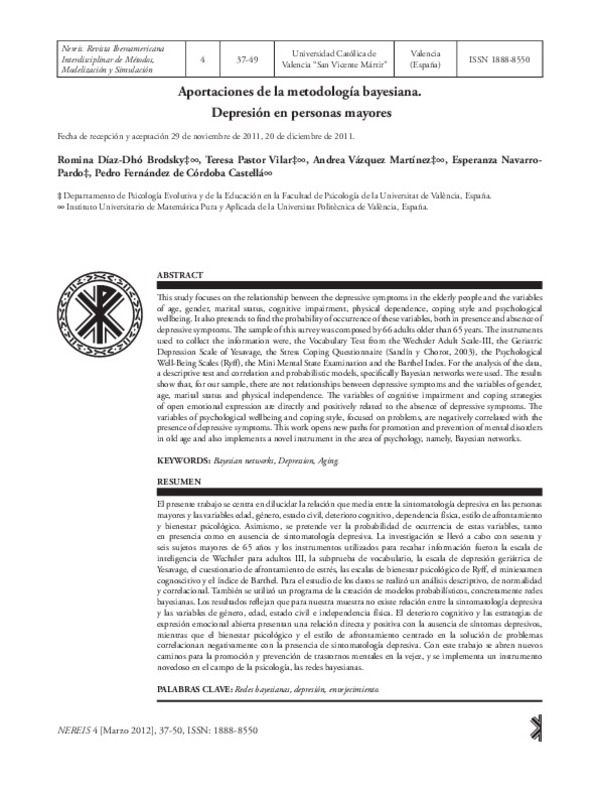|
Resumen:
|
[ES] El presente trabajo se centra en dilucidar la relación que media entre la sintomatología depresiva en las personas
mayores y las variables edad, género, estado civil, deterioro cognitivo, dependencia física, estilo ...[+]
[ES] El presente trabajo se centra en dilucidar la relación que media entre la sintomatología depresiva en las personas
mayores y las variables edad, género, estado civil, deterioro cognitivo, dependencia física, estilo de afrontamiento
y bienestar psicológico. Asimismo, se pretende ver la probabilidad de ocurrencia de estas variables, tanto
en presencia como en ausencia de sintomatología depresiva. La investigación se llevó a cabo con sesenta y
seis sujetos mayores de 65 años y los instrumentos utilizados para recabar información fueron la escala de
inteligencia de Wechsler para adultos III, la subprueba de vocabulario, la escala de depresión geriátrica de
Yesavage, el cuestionario de afrontamiento de estrés, las escalas de bienestar psicológico de Ryff, el miniexamen
cognoscitivo y el índice de Barthel. Para el estudio de los datos se realizó un análisis descriptivo, de normalidad
y correlacional. También se utilizó un programa de la creación de modelos probabilísticos, concretamente redes
bayesianas. Los resultados reflejan que para nuestra muestra no existe relación entre la sintomatología depresiva
y las variables de género, edad, estado civil e independencia física. El deterioro cognitivo y las estrategias de
expresión emocional abierta presentan una relación directa y positiva con la ausencia de síntomas depresivos,
mientras que el bienestar psicológico y el estilo de afrontamiento centrado en la solución de problemas
correlacionan negativamente con la presencia de sintomatología depresiva. Con este trabajo se abren nuevos
caminos para la promoción y prevención de trastornos mentales en la vejez, y se implementa un instrumento
novedoso en el campo de la psicología, las redes bayesianas.
[-]
[EN] This study focuses on the relationship between the depressive symptoms in the elderly people and the variables
of age, gender, marital status, cognitive impairment, physical dependence, coping style and psychologica ...[+]
[EN] This study focuses on the relationship between the depressive symptoms in the elderly people and the variables
of age, gender, marital status, cognitive impairment, physical dependence, coping style and psychological
wellbeing. It also pretends to find the probability of occurrence of these variables, both in presence and absence of
depressive symptoms. The sample of this survey was composed by 66 adults older than 65 years. The instruments
used to collect the information were, the Vocabulary Test from the Wechsler Adult Scale-III, the Geriatric
Depression Scale of Yesavage, the Stress Coping Questionnaire (Sandín y Chorot, 2003), the Psychological
Well-Being Scales (Ryff), the Mini Mental State Examination and the Barthel Index. For the analysis of the data,
a descriptive test and correlation and probabilistic models, specifically Bayesian networks were used. The results
show that, for our sample, there are not relationships between depressive symptoms and the variables of gender,
age, marital status and physical independence. The variables of cognitive impairment and coping strategies
of open emotional expression are directly and positively related to the absence of depressive symptoms. The
variables of psychological wellbeing and coping style, focused on problems, are negatively correlated with the
presence of depressive symptoms. This work opens new paths for promotion and prevention of mental disorders
in old age and also implements a novel instrument in the area of psychology, namely, Bayesian networks.
[-]
|







